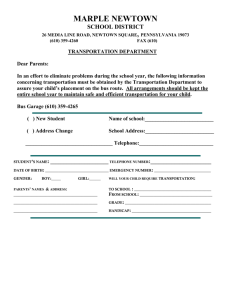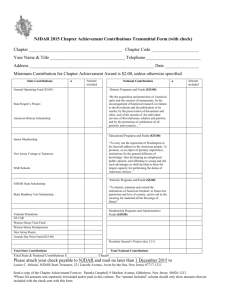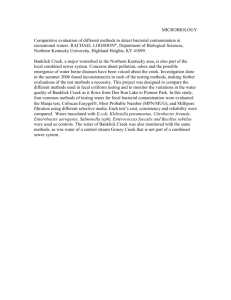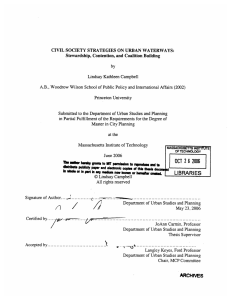Newswire
advertisement
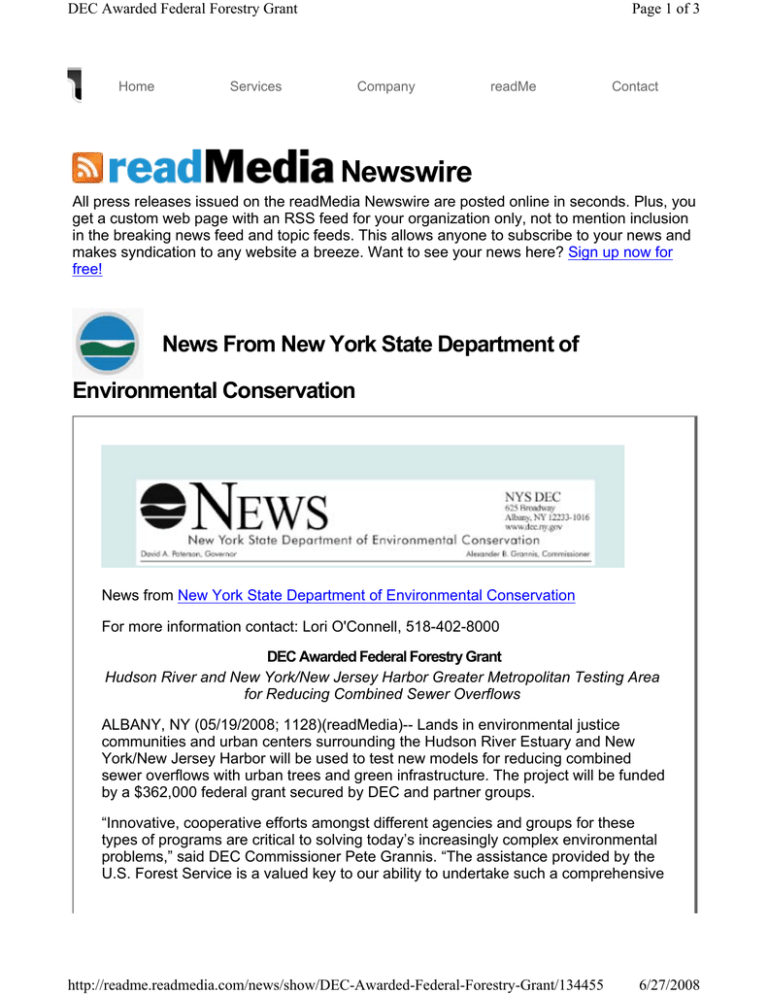
DEC Awarded Federal Forestry Grant Home Page 1 of 3 Services Company readMe Contact Newswire All press releases issued on the readMedia Newswire are posted online in seconds. Plus, you get a custom web page with an RSS feed for your organization only, not to mention inclusion in the breaking news feed and topic feeds. This allows anyone to subscribe to your news and makes syndication to any website a breeze. Want to see your news here? Sign up now for free! News From New York State Department of Environmental Conservation News from New York State Department of Environmental Conservation For more information contact: Lori O'Connell, 518-402-8000 DEC Awarded Federal Forestry Grant Hudson River and New York/New Jersey Harbor Greater Metropolitan Testing Area for Reducing Combined Sewer Overflows ALBANY, NY (05/19/2008; 1128)(readMedia)-- Lands in environmental justice communities and urban centers surrounding the Hudson River Estuary and New York/New Jersey Harbor will be used to test new models for reducing combined sewer overflows with urban trees and green infrastructure. The project will be funded by a $362,000 federal grant secured by DEC and partner groups. “Innovative, cooperative efforts amongst different agencies and groups for these types of programs are critical to solving today’s increasingly complex environmental problems,” said DEC Commissioner Pete Grannis. “The assistance provided by the U.S. Forest Service is a valued key to our ability to undertake such a comprehensive http://readme.readmedia.com/news/show/DEC-Awarded-Federal-Forestry-Grant/134455 6/27/2008 DEC Awarded Federal Forestry Grant Page 2 of 3 initiative.” The awarded project titled, “Forest Infrastructure Tools for Urban Communities,” will test new models for reducing the impact of stormwater on city sewer systems. It will focus on three areas: 1.) Bronx River near the Cross Bronx Expressway, 2.) Newtown Creek in Brooklyn, 3.) Newark Bay/ Upper New York Bay in New Jersey. Estuaries are some of the most productive natural resources, both biologically and economically, in the world. The Hudson River and the New York/New Jersey Harbor estuary serves as spawning and nursery grounds for more than 200 fish and shellfish species, nesting area for eagles and habitat for numerous migratory bird species. The estuary is used for commercial fishing and navigation, recreation, and municipal drinking water. However, like most coastal urban areas in the U.S., the Estuary and New York/New Jersey Harbor are affected by many human-influenced stresses, such as increases in impervious surfaces (roads, buildings and parking lots), loss of plant cover, urban runoff, inadequate or under-maintained sewers and municipal wastewater treatment plants, and atmospheric deposition of pollutants. Green infrastructure can revitalize and beautify neighborhoods, serve as carbon sinks to reduce local carbon dioxide levels, help alleviate urban heat center problems, and serve as a treatment system for storm water. A single tree can reduce runoff to sewers by up to 13,170 gallons per year. On-site stormwater retention also lowers energy costs for wastewater treatment plants. To meet these objectives, this project will utilize native tree species planted in expanded tree pits equipped with StormChambers, underground storm water infiltration structures that provide water holding capacity and groundwater recharge while sustaining soil ecology and maximizing tree survival. Green infrastructure is especially crucial to minority and low-income communities in urban areas where harms and risks result from a higher density of contaminated sites, air and water pollution, noise, and lack of green open space and waterfront access. These Environmental Justice Communities also experience the burdens of potentially associated public health impacts, such as asthma. This project presents a unique collaboration between two state Urban and Community Forestry programs (New York and New Jersey), two regional ecosystem-based estuary programs (Hudson River and New York/New Jersey Harbor), local municipalities in New York and New Jersey, research partners (Drexel and Columbia Universities), and non-profit organizations including Riverkeeper, Youth Ministries for Peace and Justice, and Newtown Creek Alliance. Project tools will be transferred to regional and state agencies for broad national implementation. “Vegetation holds the key to making New York City more livable and our waters cleaner,” said Basil Seggos, Riverkeeper’s Chief Investigator. “By directing storm water to an expanded network of parks, street trees, and green roofs, we prevent it from entering the sewer system and causing sewage overflows into New York Harbor. And this approach confers substantial sustainability benefits in reduced air temperatures, energy savings, and green infrastructure in formerly blighted http://readme.readmedia.com/news/show/DEC-Awarded-Federal-Forestry-Grant/134455 6/27/2008 DEC Awarded Federal Forestry Grant Page 3 of 3 communities.” The first pilot project will be administered by Youth Ministries for Peace and Justice (YMPJ), a youth development organization with more than fourteen years of experience working in Bronx Community District 9. YMPJ has already identified a specific sewershed drainage area (HP-009) to focus their reforestation efforts, where 680 million gallons of untreated wastewater are released into the lower Bronx River each year. The second pilot project will be conducted on Newtown Creek, one of the most polluted waterways in North America. Newtown Creek receives 2.7 billion gallons per year from 20 CSO outfalls. The watershed is one of the most impervious citywide with low rates of parks, tree cover, and open space. Since a specific sewershed has not yet been selected, the Newtown Creek project will initially perform intensive watershed planning using the same techniques employed in the Bronx. -30- Copyright © 2008 readMedia, Inc. - All Rights Reserved. - Terms of Service - Privacy Policy - Site Map http://readme.readmedia.com/news/show/DEC-Awarded-Federal-Forestry-Grant/134455 6/27/2008
